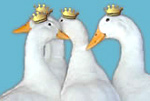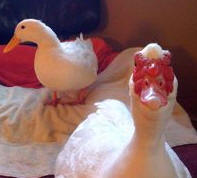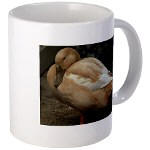Winter Supplies
As the cold weather begins to set upon us, be sure you have your supplies ready.
1) Heated water buckets. Remember, to read the instructions! They must be plugged directly into an outlet. No extension cords!
2) Be sure to have plenty of hay on hand to get you through the cold season. Bails of hay stacked against walls make a nice insulating layer. Keep at least 6 inches of clean hay under foot as well to keep your ducks and geese cozy and warm.
3) Be sure to have a supply of sand ready for winter safety. Spread it over slippery surfaces to prevent slips and injuries. You can also spread sand over poop that can't decompose into the frozen ground. Sand prevents your pens from becoming both unsightly and it also reduces the risk of foot infections.
A Few Reminders:
1) Ducks and geese should not be allowed to swim in water that could freeze and snare them if they fall asleep on it. This especially includes kiddie pools and small bodies of water.
2) Bills and feet are susceptible to frost bite! Feathered friends should be protected from cold temperatures--especially when they dip below 15 degrees Fahrenheit. Keep your feathered friends out of ice storms and other bad weather.
3) Winter bedding should be at least 6 inches thick in their duck/goose house to help insulate them from the cold.
Oil Gland
We get quite a few emails about oil glands and feather issues.
The oil gland is located just above the tail of your duck or goose. You will frequently see your bird tucking their head and bill there while preening to gather the oil they need to spread over their feathers using the combs inside their bill.
Inactive or blocked oil gland
Occasionally the oil gland can become blocked and will stop producing some or all of its oil. If you notice a decline in the appearance of your duckís feathers this could be one of the causes.
Part the feathers over their oil gland and check for obvious swelling that indicates an impacted oil gland. Use your fingers to gently feel along the base of the feathers growing from the gland. Slide your fingers upward along a few of the feathers around the gland and then look at your fingers and rub them together. If you see or feel ample oil on your fingertips, your birdís oil gland is working fine. If it is difficult for you to collect a decent amount, their oil gland may not be functioning properly or may even be blocked.
When an oil gland becomes blocked, you can try these remedies:
1) Oil glands can become blocked because of infection. Your vet will likely prescribe a round of Baytrilģ for 7-14 days. If this does not jump start your birdís oil gland your vet will usually try to collect a small sample of oil and make a slide to check for the presence of bacteria.
2) It is important to evaluate your birdís diet. An improper diet is a common cause of a malfunctioning oil gland. Is your pet duck or goose on brand named food? What kind of snacks are you giving them? Can their diet be improved upon? These are the questions you want to ask yourself and act upon if needed.
3) Vitamin A deficiency can be another cause of a blocked oil gland. A vitamin supplement should be immediately added to your birdís diet in addition to antibiotics to ensure that you are addressing every possibility. Gimborn Vionateģ Vitamin Mineral Powder for Pets is a very good supplement if used according to the label and is available for purchase on the internet. You can add it directly to your birdís food. Consult with your vet first to avoid overdosing, which can be potentially dangerous.
4) Hot packs (not too hot!) can be used to provide moist heat therapy directly to the oil gland. Warm, gentle massages to the gland 2-3 times a day can also be effective in getting it working again.
5) Stress can also be the cause of a failing oil duct. If one of your birds is being picked on by another flock member or if they have recently experienced some kind of stress, they may need a quiet reprieve. If you think this may be part of the problem, try giving them their own separate accommodations, where they are still in sight of the others, for some downtime.
6) The implementation of wheat into your birdís diet can also help their oil gland to recover and produce more oil (brand name foods often have this in the mix). Some vets also advise adding a little bit of fish oil to your birdís diet. Be careful not to add too much oil. If the oil gets in the comb of their bill and they preen, you will just make matters worse. Another option is to supplement their diet with a bit of small, round cat kibble that has fish oil in it.
Impacted oil gland
An impacted oil gland is usually clearly visible by the time you notice a difference in feather quality. If you part your birdís feathers and see that the gland is very swollen, you are probably witnessing an impacted oil gland. The same therapies used for both inactive and blocked oil glands may be attempted. Some vets may suggest lancing the gland to empty it out, but if the source of the problem is not resolved, the gland will likely just refill.
Ruptured oil gland
Ruptured glands must be surgically removed immediately and your bird will require antibiotics. A drain may need to be inserted for a few days. Following surgery, your bird will no longer repel water the way they did prior to the operation.
Chronic Wet Feather
When a duckís feathers are no longer able to properly repel water, the condition is referred to as wet feather. Sometimes wet feather can be repaired, other times it is in a chronic stage and only a full molt will repair the situation. Even in a chronic situation, it is often possible to at least improve their feather situation and aid in their waterproof effectiveness until the next molt.
Poor feather quality
If your duck or gooseís feathers appear tattered and are not properly ďzip lockedĒ together, they will not likely be waterproof. The first part of treatment is to determine the cause of this condition. Review each of these possibilities and see if any apply to your duck or goose.
- Parasites
Does your duck or goose have lice or mites? Have a vet examine your bird to see if there are parasites present. The remedy may be as simple as a powder treatment. However, if the parasite problem has been long-lived, your duckís feathers may be damaged and they may not recover from wet feather until the parasites are removed and the next molt arrives.
- Bath water shortage
Are you providing your duck or goose with enough fresh water for them to bathe in? If your bird doesnít have the opportunity to keep clean and oil up, their feathers will lose their ability to repel water. Provided the condition has not gone on for so long as to cause feather damage, the re-introduction of water should lead your pet on the road to recovery.
- Malnutrition
Is your duck or goose on a diet specifically designed for waterfowl? A healthy diet is their main defense against this problem. This explains why you are more apt to see wet feather in ducks who have been dropped off and abandoned on ponds and who are being fed bread as a main staple. They arenít getting the vitamins and minerals they need to keep themselves and their feathers healthy. Once a proper diet is restored (Mazuri Waterfowl brand feed is our personal favorite), feathers will improve, although full waterproofing may not be accomplished until their next molt.
- Illness
Could your duck or goose be ill? A sick bird can fall behind on the preening and oiling of their feathers. Once health is restored, your birdís feathers should return to their clean and natural state. During times of illness, it will really help your pet if you carry them to the tub and let them float for a bit and then allow them time to dry on a soft bed of towels.
- Failing oil gland
Is your duck or goose's oil gland functioning properly? A failing oil gland can definitely lead to poor feather quality. Once your duckís oil gland issue is remedied their feather quality should improve.
Once the root cause of your duck or goose's poor feather condition is remedied, your duck or goose may need a little help getting their feathers back in shape again. Click Here to learn more about what you can do to help.






